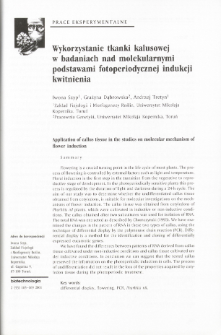- Search in all Repository
- Literature and maps
- Archeology
- Mills database
- Natural sciences
Advanced search
Advanced search
Advanced search
Advanced search
Advanced search

Object
Title: Wykorzystanie tkanki kalusowej w badaniach nad molekularnym ipodstawami fotoperiodycznej indukcji kwitnienia
Subtitle:
Application of callus tissue in the studies on molecular mechanism offlower induction
Publisher:
Komitet Biotechnologii PAN ; Instytut Chemii Bioorganicznej PAN
Abstract:
Flowering is a crucial turning point in the life cycle of most plants. The process offlowering is controlled by external factors such as light and temperature.Floral induction is the first step in the transition from the vegetative to reproductive stage of development. In the photoperiodically sensitive plants this process is regulated by the duration of light and darkness during a 24-h cycle. Theaim of our study was to determine whether the undifferentiated callus tissueobtained from cotyledons, is suitable for molecular investigations on the mechanisms of flower induction. The callus tissue was obtained from cotyledons ofPharbitis nil plants, which were cultivated in inductive or non-inductive conditions. The callus obtained after two subcultures was used for isolation of RNA.The total RNA was extracted as described by Chomczynski (1993). We have examined the changes in the pattern of RNA in these two types of callus, using thetechnique of differential display by the polymerase chain reaction (PCR). Differential display is a method for the identification and cloning of differentiallyexpressed eucaryotic genes.
Relation:
Biotechnologia, vol.53, 2 (2001)-.
Volume:
Issue:
Start page:
End page:
Detailed Resource Type:
Format:
Resource Identifier:
0860-7796 ; oai:rcin.org.pl:139325 ; IChB B-49
Source:
Biblioteka Instytutu Chemii Bioorganicznej PAN
Language:
Language of abstract:
Temporal coverage:
Rights:
Licencja Creative Commons Uznanie autorstwa-Na tych samych warunkach 4.0
Terms of use:
Digitizing institution:
Instytut Chemii Bioorganicznej Polskiej Akademii Nauk
Original in:
Instytut Chemii Bioorganicznej Polskiej Akademii Nauk
Projects co-financed by:
Access:
Object collections:
- Digital Repository of Scientific Institutes > Partners' collections > Institute of Bioorganic Chemistry PAS > Articles
- Digital Repository of Scientific Institutes > Literature > Journals/Articles
Last modified:
Oct 2, 2020
In our library since:
Sep 17, 2020
Number of object content downloads / hits:
233
All available object's versions:
https://rcin.org.pl./publication/174725
Show description in RDF format:
Show description in RDFa format:
Show description in OAI-PMH format:
| Edition name | Date |
|---|---|
| Wykorzystanie tkanki kalusowej w badaniach nad molekularnym ipodstawami fotoperiodycznej indukcji kwitnienia | Oct 2, 2020 |
Objects Similar
Dąbrowska, Grażyna Veit, Justyna Goc, Anna Tretyn, Andrzej
Borkowska, Bożenna
Ziółkowski, Piotr Babula- Skowrońska, Danuta Kaczmarek, Małgorzata Cieśla, Agata Sadowski, Jan
Szyp-Borowska, Iwona Staniulyte, Ramune
Nowak, Jacek K.

 INSTYTUT ARCHEOLOGII I ETNOLOGII POLSKIEJ AKADEMII NAUK
INSTYTUT ARCHEOLOGII I ETNOLOGII POLSKIEJ AKADEMII NAUK
 INSTYTUT BADAŃ LITERACKICH POLSKIEJ AKADEMII NAUK
INSTYTUT BADAŃ LITERACKICH POLSKIEJ AKADEMII NAUK
 INSTYTUT BADAWCZY LEŚNICTWA
INSTYTUT BADAWCZY LEŚNICTWA
 INSTYTUT BIOLOGII DOŚWIADCZALNEJ IM. MARCELEGO NENCKIEGO POLSKIEJ AKADEMII NAUK
INSTYTUT BIOLOGII DOŚWIADCZALNEJ IM. MARCELEGO NENCKIEGO POLSKIEJ AKADEMII NAUK
 INSTYTUT BIOLOGII SSAKÓW POLSKIEJ AKADEMII NAUK
INSTYTUT BIOLOGII SSAKÓW POLSKIEJ AKADEMII NAUK
 INSTYTUT CHEMII FIZYCZNEJ PAN
INSTYTUT CHEMII FIZYCZNEJ PAN
 INSTYTUT CHEMII ORGANICZNEJ PAN
INSTYTUT CHEMII ORGANICZNEJ PAN
 INSTYTUT FILOZOFII I SOCJOLOGII PAN
INSTYTUT FILOZOFII I SOCJOLOGII PAN
 INSTYTUT GEOGRAFII I PRZESTRZENNEGO ZAGOSPODAROWANIA PAN
INSTYTUT GEOGRAFII I PRZESTRZENNEGO ZAGOSPODAROWANIA PAN
 INSTYTUT HISTORII im. TADEUSZA MANTEUFFLA POLSKIEJ AKADEMII NAUK
INSTYTUT HISTORII im. TADEUSZA MANTEUFFLA POLSKIEJ AKADEMII NAUK
 INSTYTUT JĘZYKA POLSKIEGO POLSKIEJ AKADEMII NAUK
INSTYTUT JĘZYKA POLSKIEGO POLSKIEJ AKADEMII NAUK
 INSTYTUT MATEMATYCZNY PAN
INSTYTUT MATEMATYCZNY PAN
 INSTYTUT MEDYCYNY DOŚWIADCZALNEJ I KLINICZNEJ IM.MIROSŁAWA MOSSAKOWSKIEGO POLSKIEJ AKADEMII NAUK
INSTYTUT MEDYCYNY DOŚWIADCZALNEJ I KLINICZNEJ IM.MIROSŁAWA MOSSAKOWSKIEGO POLSKIEJ AKADEMII NAUK
 INSTYTUT PODSTAWOWYCH PROBLEMÓW TECHNIKI PAN
INSTYTUT PODSTAWOWYCH PROBLEMÓW TECHNIKI PAN
 INSTYTUT SLAWISTYKI PAN
INSTYTUT SLAWISTYKI PAN
 SIEĆ BADAWCZA ŁUKASIEWICZ - INSTYTUT TECHNOLOGII MATERIAŁÓW ELEKTRONICZNYCH
SIEĆ BADAWCZA ŁUKASIEWICZ - INSTYTUT TECHNOLOGII MATERIAŁÓW ELEKTRONICZNYCH
 MUZEUM I INSTYTUT ZOOLOGII POLSKIEJ AKADEMII NAUK
MUZEUM I INSTYTUT ZOOLOGII POLSKIEJ AKADEMII NAUK
 INSTYTUT BADAŃ SYSTEMOWYCH PAN
INSTYTUT BADAŃ SYSTEMOWYCH PAN
 INSTYTUT BOTANIKI IM. WŁADYSŁAWA SZAFERA POLSKIEJ AKADEMII NAUK
INSTYTUT BOTANIKI IM. WŁADYSŁAWA SZAFERA POLSKIEJ AKADEMII NAUK


































